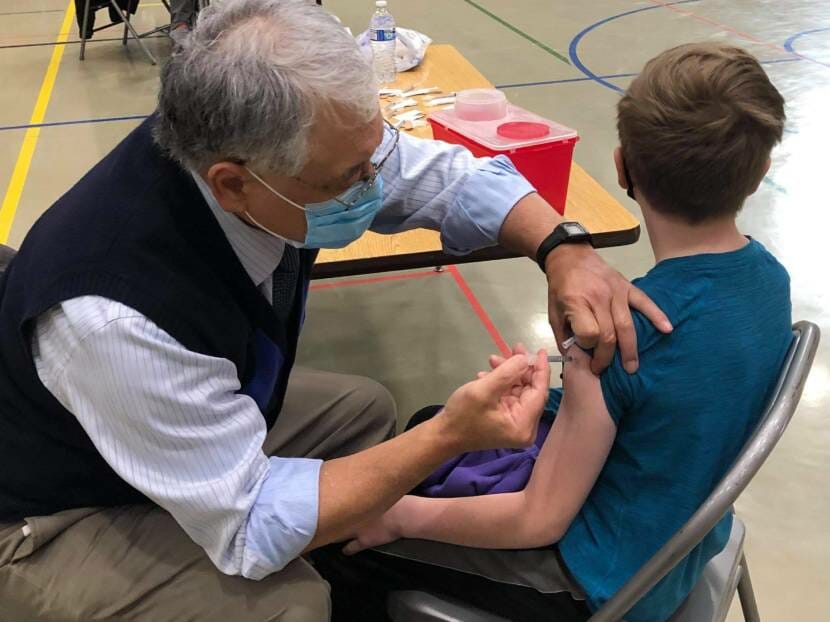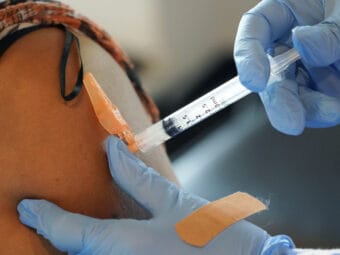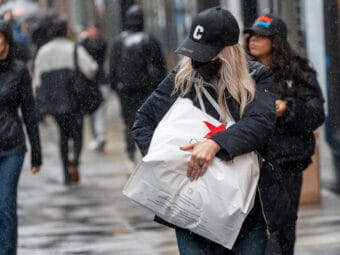
Even though Juneau is experiencing its biggest COVID surge of the pandemic, schools are open, and sports and other after-school activities are happening in person. But statewide, officials say the delta variant is hitting kids hard.
Juneau has not been spared from the delta variant. COVID-19 case counts are much higher than last year when schools were closed. But youth cases here have stayed low, even though students are spending a lot of time together.
This week, the Juneau Douglas High School: Yadaa.at Kalé cross country team is in the gym rearing up for a big meet on Saturday. Matthias or “Tias” Carney says that’s a big change from last year.
“We ran by ourselves,” he said.
All of school last year was a solo sport.
“Kind of just segregated and on the computer, staring at the computer screen and in a computer chair all day,” Carney said.
Not his ideal learning format. But he’s in school for his senior year.
Juneau has one of the highest youth vaccination rates in the state — only the Yukon-Koyukuk census region is higher. And according to state data, that translates really simply to fewer cases of COVID.
“I’d say almost all my friends are vaccinated. And I say at the high school, I think almost everyone I know is vaccinated. And I think a lot of that is because if you want to attend school, the more vaccinated, the more likely we’ll be able to stay in school. And of course, playing sports along with it,” Carney said.
Bridget Weiss, Juneau School District’s superintendent, says vaccinated people don’t have to be quarantined if they’re close contacts of a COVID-19 case so it’s keeping a lot more kids in the classroom.
“When we look at cases in our school district, it’s really clear where the most cases are. It’s our population of children that can’t be vaccinated yet. So we are doing all the right things with all kinds of mitigation layers, including masks, but it is the vaccine that is making a difference,” Weiss said.
She said there are a lot of reasons so many kids are vaccinated in Juneau. The district laid the groundwork for on-campus vaccine clinics even before the 12-18 age group was approved.
And she said another piece of the puzzle is the community: Juneau has one of the only city-wide mask mandates in the state. It’s also got a high rate of adults who are vaccinated.
“If we see a range in adult vaccinations, we see that’s kind of amplified in the 12- to 18-year-old group,” said Dr. Anne Zink, Alaska’s Chief Medical Officer. “So the communities that we have that are least vaccinated, they’re less likely to vaccinate their 12- to 18-year-olds versus those who are vaccinated or have high vaccination rates, they’re more likely to vaccinate their 12- to 18-year-olds.”
Youth tend to handle COVID-19 infections better than adults. They don’t typically get as sick. Though, the long-term effects of a childhood COVID-19 infection are yet to be seen.
And, no kids in Alaska have died from the virus.
But Fairbanks pediatrician Mishelle Nace says the delta variant is still a cause for concern. And there are only two pediatric ICUs in the state, both in Anchorage.
“We’ve even had to ship kids, you know, from Fairbanks to Anchorage because they needed the ICU care. And when you look at the concern on the parent’s face, when you see the kid we have to draw blood from you one more time, when you see them having trouble with their breathing. That’s one kid too many,” Dr. Nace said.
Just over 30% of youth are vaccinated in Fairbanks. Dr. Nace says that means she’s seeing more kids of all ages in the hospital.
“Both those ages 12 to 18, who are eligible, but just didn’t get vaccinated. And we’re seeing those who are younger, down to infants down to newborn period being admitted COVID positive with concern for symptoms,” she said.
Dr. Nace is quick to note that while the vaccine is the most effective tool for preventing COVID-19, it’s not the only one. Things like masking, staying socially distanced, and getting tested are all really important.
Another protection is antibody treatment, which youth older than 12 can use if they’ve recently tested positive or been in close contact with someone who has.
Back at Juneau Douglas High School gym, coach Tristan Knutson-Lombardo says he’s relieved the team is traveling and competing as a group.
“This year, we’ve had the opportunity to say, you know what, we’re going to actually go to the same location as other teams. And now you get to see how your performance helps the larger collective do well in a race,” he said.
He says it’s a mix of a high vaccination rate and open communication about risks that keeps everyone safe — and keeps the team progressing.
“When you do it together, it’s just … it’s easier. It’s more fun. And yeah, you run faster,” Knutson-Lombardo said.
The team hasn’t seen any positive cases yet.



